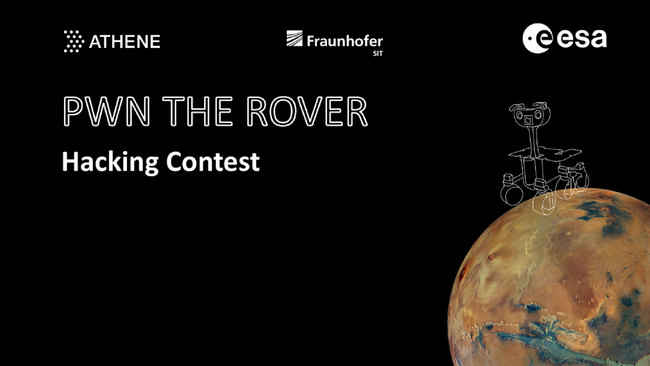20.09.2023
Hacking contest with virtual Mars mission
ATHENE and ESA host international cybersecurity contest
The National Research Center for Applied Cybersecurity, ATHENE, and the European Space Agency, ESA, are jointly launching an international hacking contest for students. Themed "PWN the Rover", teams of participants must first complete a series of hacking challenges. The eight teams that qualify in this preliminary round will then be allowed to compete in the finals at the ESA’s European Space Operations Centre (ESOC) in Darmstadt on 17 October 2023 and put their hacking skills to the test on ESA’s ExoMy 3D printed rovers. The winning team will receive attractive prizes such as Hak5 USB Rubber Duckies, participation in a practical training simulation by ESA (Ladybird Guide to Mission Operations Training) for the support of a real space mission and security training at the Fraunhofer Cyber Range, where IT teams train for the severity of a cyberattack. For more information, visit www.pwn-the-rover.space.
Space is bracing itself for cyber challenges: Hackers and state attackers are increasingly targeting satellites and satellite communications. Space has become an attractive target for attacks, as more and more services on Earth rely on data collected in space or transmitted via satellites. Even services that are taken for granted, such as navigation, are impossible without a secure space infrastructure. At the same time, space is sometimes more challenging to defend against cyberattacks: Depending on the mission, slow response times, lower bandwidth or limited accessibility of spacecraft can pose additional challenges in detecting and defending against attacks. As cyber security becomes increasingly important for space missions, ATHENE and ESA are already collaborating on shaping the future of cyber security. To train future experts, ATHENE and ESA are sending the hacking competition participants into cyber battle on a virtual Mars mission.
The story: One rover per team has been sent to Mars to carry out an important exploration mission. Each team must navigate an obstacle course and scan as many QR codes as possible along the way. The QR codes contain hacking challenges that the teams must solve in order to earn points. While one team is navigating the course, the other teams can try to hack the opponents' rover and obstruct it in its path. Before the final participants can compete in this rover mission, they must prove their hacking skills in an online challenge. The preliminary round to qualify for the final in Darmstadt started on 1 September 2023 with the release of hacking challenges. The finalists for the competition in Darmstadt on 17 October 2023 are currently being selected.

